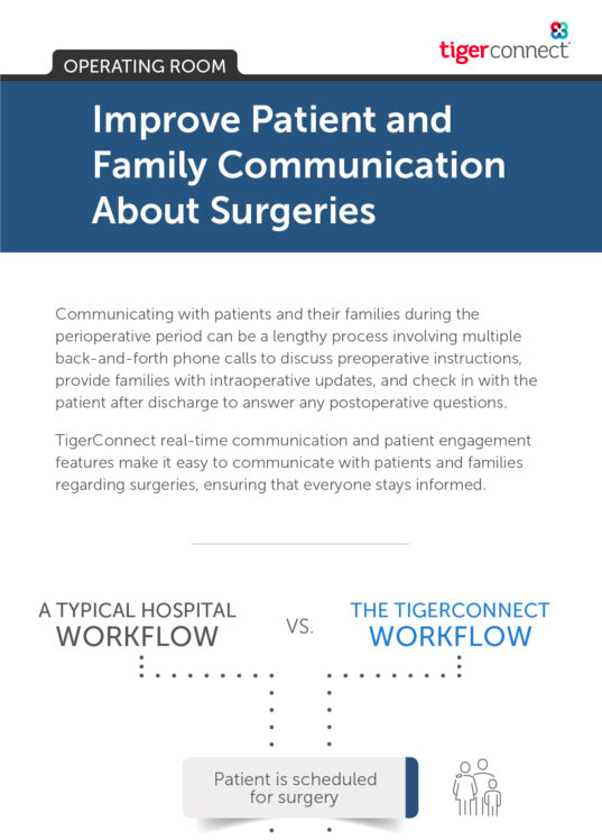Home / Blog /
How to Improve Perioperative Patient and Family Communication

How to Improve Perioperative Patient and Family Communication
Undergoing surgery can be a stressful experience for patients and their families as they navigate the ins and outs of the perioperative process. This period constitutes a delicate interplay between doctors, care teams, patients, and their families, underscoring the essential need for effective communication among all parties involved. Communicating with patients before and after their surgical procedure is essential to successful surgical outcomes and patient satisfaction. But family communication is just as critical. Studies have shown that perioperative communication is important in reducing anxiety and improving the overall experience of family members waiting for surgical patients. Read on to discover the importance of effective communication with patients and families throughout the perioperative process, including surgery preparation, the procedure, and post-discharge follow-up guidelines.
Improve Perioperative Patient and Family Communication with TigerConnect
|
 |
The power of pre-op instructions: establishing trust and preparedness
A patient’s surgical journey doesn’t begin and end at the time of the procedure. It starts with the pre-operative phase, the first opportunity for physicians to provide patients and their families with vital information about the procedure, assuaging their concerns and building trust.
Precise guidance on pre-op preparations, dietary restrictions, and medication protocols empowers patients to play an active role in their own well-being. This phase offers an avenue for healthcare professionals to address any remaining uncertainties and customize instructions to meet individual requirements, nurturing a collaborative partnership between the medical team and the patient. It’s also the best opportunity for patients and families to ask questions about the procedure, ensuring that they are able to follow any pre-op instructions.
In addition to improving patient experience and ensuring a smooth procedure, improving pre-op communication also prevents cancellations. Over 10 million outpatient surgical procedures occur in the U.S. each year, yet between 3–10% of these surgical procedures are canceled days or even hours before an appointment. Studies have found that the top reasons for these surgical cancellations in ambulatory settings were preventable – from patient no-shows to failure to follow pre-operative guidance. Enhancing the pre-op communication process ensures that patients are easily able to access their pre-op instructions and address any concerns with their provider.
Intra-op updates: bridging the gap between uncertainty and reassurance
Surgical procedures are a time of heightened anxiety for patients and their loved ones. Intra-operative updates function as a vital link between the operating room (OR) and the waiting area, delivering up-to-the-minute information to address family concerns and questions. Studies have shown that the more frequently families are updated during surgical procedures, the more family anxiety is reduced, leading to a better overall experience. Many patient engagement solutions are designed to standardize communication between healthcare staff and the patient’s support system. These systems provide essential perioperative communication that decreases anxiousness in those who are impatiently waiting for news of their loved one. Consistent communication from the surgical team, whether from digital communication platforms or in-person, is essential in comforting, debunking misconceptions, and keeping families in the loop about the surgery’s advancement.
Post-op follow-up: guiding optimal recovery and emotional well-being
The significance of effective communication doesn’t diminish once the surgery is complete. Post-operative recovery requires a precise blend of medical direction and emotional support. Comprehensive guidelines for the post-op period, including medication regimens and self-care protocols, empower patients with the resources essential for a successful recuperation. Attending to queries, tracking advancement, and providing reassurance during this stage fosters convalescence and nurtures emotional welfare, diminishing the chances of complications while amplifying patient satisfaction. Additionally, communicating with patients about follow-up appointments is crucial so that appointments are not missed.
Staying connected with patients after they’ve gone home helps alleviate potential problems and spurs recovery. However, shifting priorities among staff members responsible for handling phone calls with patients and families causes the method of communication to become time-intensive and subject to delays. To fill the communication breakdown gap, hospitals and medical facilities can leverage technology to help create better patient fulfillment. Keeping in contact with patients post-op through text eases the burden on clinicians and increases patients’ perceptions of connectedness with their healthcare team, thereby improving their satisfaction with the recovery process.
Streamline perioperative communication with TigerConnect
Deploying a clinical communication and collaboration platform like TigerConnect effectively improves the array of communication challenges that surgical teams encounter when interacting with patients and their families. The TigerConnect Clinical Collaboration platform offers tools that enhance collaboration for sharing patient updates, intra-op discussions, post-op follow-ups, and discharge needs through text, voice, or video. The platform also ensures the security of patient data, enhances operational processes and expedites response times by promptly addressing critical messages. Automating the surgical communication workflow with role-based messaging decreases care delays and reduces readmissions by sending automatic scheduling reminders, reviewing medication instructions, and finalizing pre-appointment paperwork.
TigerConnect Patient Engagement enables patients to actively participate in their health journey by allowing easy communication with their care team, encouraging their engagement in the recovery process and overall recovery journey. It also facilitates secure group messaging between care teams, patients, and their families to help reduce missed surgeries, boost patient engagement and satisfaction, and provide clinicians with more invaluable time. This consistent and strong line of communication reduces pressure on patients, their families, and the care teams, ensuring a seamless continuum of care throughout the entire perioperative process. Medical professionals who make effective communication a central tenet of their practice cultivate a more nurturing atmosphere that enhances recuperation and elevates the patient’s perioperative journey.
Ryan Bush, MSN, RN-BC, Clinical Nurse Consultant
Ryan Bush is a Clinical Nurse Consultant at TigerConnect with over 14 years of experience in a variety of healthcare roles including bedside nurse, clinical applications analyst and most recently a manager of nursing informatics for the Cleveland Clinic in Cleveland, OH. Ryan holds a Masters and board certification in the field of Nursing Informatics.
Tags: surgery, pre-op instructions, post-op communication, perioperative communication, operating room, OR communication, surgical communication, pre-op communication, intra-op communication, Blog, Patient Communication








